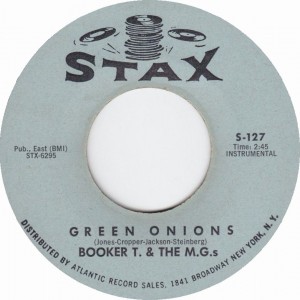
 At the end of last week’s column I left you with a bonus video featuring Booker T & the MG’s with their version of the week’s featured song, “Groovin’.” Since this week marks the 68th birthday of Booker T. Jones himself, I thought I’d give Mr. Jones and the band their own spot this week.
At the end of last week’s column I left you with a bonus video featuring Booker T & the MG’s with their version of the week’s featured song, “Groovin’.” Since this week marks the 68th birthday of Booker T. Jones himself, I thought I’d give Mr. Jones and the band their own spot this week.
By every musical measure, Booker T & the MG’s were one hell of a band. In addition to Jones on keyboards, the classic lineup featured Steve Cropper on guitar, Donald ‘Duck’ Dunn on bass, and Al Jackson, Jr. behind the drums. These unstoppable musicians were the cream of the Memphis music scene, and as the house band at Stax Records they played on hundreds of classic soul records.
Included among the artists that Booker T & MG’s provided superlative backing for were legendary voices like Otis Redding, Carla Thomas, Wilson Pickett, Sam & Dave, and Johnny Taylor. It would be fair to say that they originated the Stax sound that has been often imitated, but never duplicated. And if that wasn’t enough they also broke new ground by being an integrated group in the south in the ’60s.
Jones was just 17 years-old when he began playing with Cropper and Jackson in 1962. Dunn wasn’t on board yet the day they did a session backing Billy Riley with Lewie Steinberg handling the bass chores. It was during a break in that session that the quartet began messing around with simple little blues riff. Stax president Jim Stewart liked what he heard and pressed the record button. Then they recorded a second song. It was based on a riff that Cropper remembered Jones playing a few weeks earlier.
Stewart wanted to release the first song, “Behave Yourself,” as the A side, but Cropper thought differently. As it turned out, so did the DJs who heard both sides of the record. That’s how the second song, a little something that came to be known as “Green Onions”, wound up as the A side. Memphis DJ Reuben Washington of WLOK liked the record so much that he played it four times in a row before the song, or the band for that matter, even had a name.
“Green Onions” was first released on Volt Records as the B side of “Behave Yourself” in May, 1962. A few months later, in September of that year, the record was flipped and reissued by Stax. It was a smash. The single hit #1 on the Billboard R&B chart, and raced all the way up to #3 on the pop chart.
Booker T & the MG’s had other hits, lots of them. But none every approached the success of their very first. It’s been covered many times by everyone from Henry Mancini to Johnny Thunders. “Green Onions” has been featured in movies and tv shows too numerous to mention. Rolling Stone ranked the record at #183 in their 500 greatest songs of all time list. The record won a Grammy Hall of Fame Award in 1999, and was added to the Library of Congress’ National Recording Registry this year. In other words it was, and is, one badass record.
Duck Dunn replaced Steinberg on bass in 1965. Booker T & the MG’s kept issuing singles throughout the ’60s and beyond. Their final Stax single was 1971’s “Melting Pot.” By then Jones was already gone from Stax, and Cropper was on his way out the door. Dunn and Jackson remained and did session work, finally giving up the MG’s at the end of the year.
There were sporadic reunions over the next few decades. Unfortunately most of them took place without Jackson, who was murdered in his home in 1975. Booker T & the MG’s were inducted into the Rock and Roll Hall of Fame in 1992, and played there when the museum opened three years later. In 2007 the were given the Grammy Lifetime Achievement Award.
Donald ‘Duck’ Dunn passed away on May 13, 2012 while on tour with Cropper in Japan.
[youtube id=”dHq4laFwAEM” width=”600″ height=”350″]




Comments